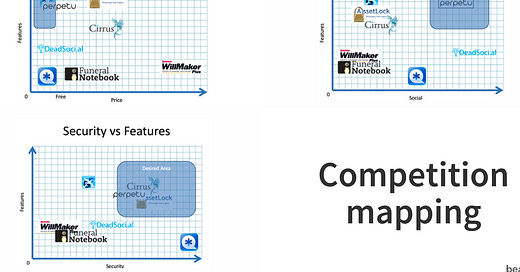How I got my competition wrong
Learn from my fail and see your market through the eyes of your customer
Shoutout to all new subscribers, welcome aboard! But also a shoutout to all of you that have been reading. Thanks! Today, I want to talk about competition.
At some point in my startup (Just in Case, a 50-sec explainer video), I felt I should research competition.
Googling, visiting competitor websites, take stock of competitors. This was my result:
Looks fancy, right? From the start, there was a problem with this analysis.
I identified four dimensions:
Price
Features - My sense of the number of features of the competing solution
Social - My sense of how 'social media-y' the competing solution was
Security - My sense of how security-focused the competing solution was.
The problem? We scored best on all of them. Isn't that amazing!?
These dimensions were probably unconsciously derived from the feature set we had in mind for our solution.
I felt I discovered market opportunities. Which are not really apparent from this analysis. Every desired area already had competitors there. Not necessarily a bad thing, but I couldn't underpin why this was an opportunity.
Discovering competitors is good, it gives you an idea of what is out there. But this analysis and graphs didn't show me anything new, besides confirming my inherent assumptions. This work was highly biased.
Upgrade your hunches to actual data
What did I do wrong? I was mapping the market through my own eyes. I was not my own customer—but I didn't realise this.
I had vague dimensions such as 'social' or 'security' or 'features'. Which were not based on customer data.
I didn't know whether customers care about security, amount of features or social elements. I just assumed.
Know your true competitors
Your true competitors are the options customers consider when they pick a solution. It is not that I had did not have access to data of this kind.
Back then, I went on online forums and posted topics about this topic—I even pretended I was Emma on a female-oriented forum called VIVA. "How do you approach this problem?"
Tip: Fora such as Reddit, Quora or Discord servers can be a starting point
Benefit: These people are (anonymous) strangers, more honest with you
Watch out: Most moderated places don't allow for sales. Be genuinely interested in the lives of the potential customers. No selling. Don't talk about your solution. Focus on their problem.
I got 25-50 responses, your experience may vary.
Fast results

People listed many options to the problem, to name a few:
Writing it down on a piece of paper in an envelope in a safe at my parents
Digital document saved on Dropbox or Drive
A binder with important documents
My partner knows my password managers login
These were the true alternatives for these people. If they would see my solution, these are the options that they would compare it to. This was my competition.
Nobody listed a digital legacy tool. What does this mean? They don't know these products exist? Or do they know but hate them? I didn't find out. Why?
Because I didn't follow up. I left it at these superficial answers. We did use the envelope as an analogy and design language for the app. But that was about it.
What I would’ve done differently now
Schedule a quick call with some of the people that responded by DM'ing: “Hey, I’m trying to make a startup around this topic, can I ask you a couple of questions about your experience?”
I would try to uncover the patterns of customer behaviour. There were some digital solution-oriented people and physical solution-oriented people.
What sets these apart? Didn’t learn this.I would delve into the type of information that was saved, as it seemed to differ per person. Some people mentioned they didn't really care about music, for instance.
I never developed an understanding of what information is truly important and problematic and what information is nice to have (at Just in Case we just aimed to do it all).From here, I would try to understand what triggers people to make such a document, what context. I found in other interviews that some people do it together as partners when they move in.
When your life gets serious, like moving in together, buying a house or getting children seemed triggering situations. This is something I didn't explore very deeply.From this, I would dive deeper into the problems people run into when arranging this digital legacy stuff.
The fact that they are using alternatives means that they have solutions that work to some extent. Are there real problems?Ultimately, I would try to understand what it was that our app needed to be doing better than the competition. We had many features in one. Which problem was the biggest for our customer?
Was it coming up with questions to answers? If that's the case, some kind of survey that generates a PDF would help.
Or was it the sharing thing? Then, you could hack a Google Drive folder to only be shared with someone after two people confirm.
How was this article?
Great - Good - Meh
Any vote helps me, makes me smile like that first day at the disco.




